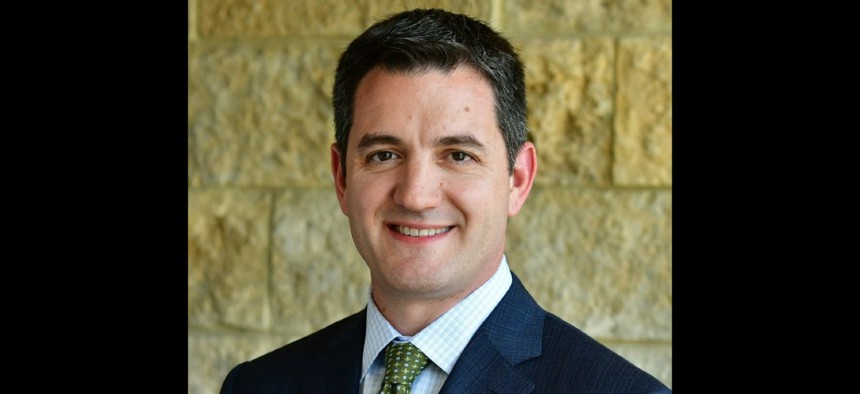Deloitte is helping agencies, companies shape post-pandemic tech risk

Jason Salzetti, head of Deloitte's government and public services practice leader, sees one of his firm's main roles as helping clients navigate the speed and rate of change. Courtesy of Deloitte.
Company No. 15 on our 2023 Top 100 is helping federal agencies and the private sector navigate a new technology landscape after the pandemic, where speed, adaptability and a greater tolerance for risk adoption are driving innovation.
Whilst no longer a public health emergency, the COVID-19 pandemic remains a transformational event for government agencies at all levels and in practically everything about their operations and citizen service delivery.
As the leader of Deloitte's government and public services practice sees it, their clients saw an opportunity to apply cloud computing-based and enabled technologies. They did so in order to rapidly innovate and deploy new solutions at the scale their enterprises and constituents demanded.
But Jason Salzetti's description of pre-pandemic mindsets at agencies versus those of today also can help explain their overarching shifts beyond just the tech.
"In years past they would look to, 'Well hey we've got to go define the problem, do detailed requirements, build an architecture, procure hardware and software, get it deployed in a government data center,'" Salzetti said. "All of that had significant cycle time that the cloud-based technology really cut down dramatically and allowed for much more iterative technology development, agile technology development."
Deloitte ranks at No. 15 on our 2023 Top 100 with approximately $3.1 billion in unclassified prime obligations.
The government and public service practice known internally as "GPS" is a team of approximately 26,000 people that sits at the intersection of technology integration, implementation and consulting.
Salzetti said the GPS team looks to provide its government clients a point of view from across not just the public sector landscape, but also what other Deloitte practices are working on for their clients in certain commercial sectors.
Private sector clients are thinking through similar problem sets in technology such as who the end users are for a new technology system or process.
"When government's more accessible, easier to use, easier to understand and much more human-centric and designed around that end user, then trust goes up, integrity goes up," Salzetti said. "That's a critical role we have to play as consultants, as contractors."
Every federal agency has a different way of considering how to assess risk with respect to new technology development and adoption. Salzetti sees increasing numbers of agencies pushing further out on that risk-taking curve after they notice those reduced cycle times.
"The speed and rate of change is something that will only accelerate, and our government clients in particular are at the forefront of having to try and take very large organizations that are used to doing something in a specific way, and try and change that over time, and now accelerate that pace of change," Salzetti said.
Look no further than the worldwide conversation about generative artificial intelligence tools that provide users text, images or other media in response to their prompts. The entire public sector ecosystem seems to be in constant dialogue over the promise, peril and implications of using generative AI at scale.
Salzetti described the federal landscape as a broad spectrum of agencies in terms of their interest in generative AI. One category is risk-averse agencies that are placing limits on what their employees can do with generative AI tools.
Category two of agencies represents those that are advocating for their staff to adopt them in fear of potentially being left behind.
How Deloitte is looking to adopt those tools within itself also illustrates the way it sees them rolling out across the government. Salzetti described Deloitte's approach as seeing generative AI more like a co-pilot for the people using them.
That co-pilot construct focuses on making jobs more efficient, especially those involving large amounts of policies and procedures that can rack up to thousands of pages.
Salzetti said a generative AI tool that is trained very narrowly on that body of knowledge could come in handy for helping a new employee get up to speed quickly.
"Think of it as that co-pilot, that person sitting in the seat next to you and using gen AI in that way, you can see a lot of pretty effective use cases that can help government deal with this rate of change," Salzetti said.
"Putting the trust and integrity element into all these solutions is absolutely critical because otherwise people will start to lose trust in the agency or department that's providing that solution," Salzetti said. "That's a key element here, what we refer to as ethical AI, and making sure there's validation and certification of the models themselves, the data and the outputs."
A future episode of WT 360 will feature the full conversation with Jason Salzetti that includes more of his perspective on that implementation-integration-consulting intersection, how the GPS team will work with Deloitte's new space practice, and a pair of key trends recently highlighted by the Deloitte Center for Government Insights such as new and emerging workforce models.


